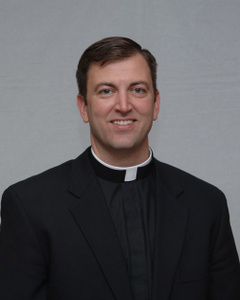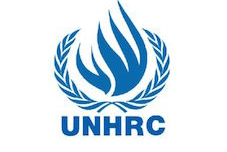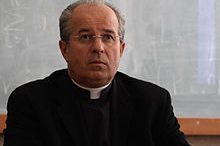Vatican calls for religious freedom at UN Human Rights Council

Mgr Richard Gyhra
The Vatican has said there is "a lack of political will on the part of the different Institutions of the International community" to address attacks on the right of religious freedom. The comments were made during a United Nations Human Rights Council discussion on the Report of the Special Rapporteur on freedom of religion or belief on Wednesday.
"Minimizing the essential role that religion has in all societies will not be the answer to the current challenges found in the interplay of the freedom of religion and the freedom of expression," said Mgr Richard Gyhra, Chargé d'Affaires of the Permanent Mission of the Holy See to the United Nations and Other International Organizations in Geneva.
"We live in a world subject to the 'globalization of the technocratic paradigm,' which consciously aims at a one-dimensional uniformity and seeks to eliminate all differences and traditions in a superficial quest for unity," he continued.
"Religions thus have the right and the duty to make clear that it is possible to build a society where 'a healthy pluralism which respects differences and values them as such' is a precious ally in the commitment to defending human dignity... and a path to peace in our troubled world," said Msgr. Gyhra.
"The tendency to globalization is not necessarily bad. On the contrary, if it unites us, it can be noble. However, we are all aware that 'globalization makes us neighbors, but does not make us brothers'."
The Vatican diplomat said another essential aspect to the respect for freedom of religion or belief and its relationship with freedom of expression is the limitation that some forms of national legislation impose by not permitting an open exercise of the freedom of religion.
"For a diminution of violations of this essential right, it is imperative that all persons of all religious persuasions, or of no religion, are treated equally as citizens in the fullest sense, without discrimination and persecution because of their convictions or beliefs," Msgr. Gyhra said.
The full text of Mgr Gyhra's address follows:
Intervention by Mgr Richard Gyhra, Chargé d'Affaires a.i. of the Permanent Mission of the Holy See to the United Nations and Other International Organizations in Geneva at the 31 st Session of the Human Rights Council Item 3 - Report of the Special Rapporteur on freedom of religion or belief.
Mr President,
The Special Rapporteur on the freedom of religion or belief has provided us with a rather thought-provoking Report which addresses the interplay and interconnectedness of this freedom with the freedom of expression. The ongoing and world-wide terrorist attacks, as well as the greater relation between religion and tolerance, underscore the necessity of reflecting upon these basic freedoms, of how we approach and understand them, and the "rights" and "obligations" demanded by them. Studies and statistics indicate a rather sober and sad reality when they show that limits and abuses of the freedom of religion or belief are continuing to increase in many countries. This trend is very alarming for the Holy See as it seems to indicate a lack of political will on the part of the different Institutions of the International community to address the causes of such violence and that there is a long path that lies ahead in the area of mutual understanding and dialogue. Often times, the public reactions to these unfortunate and violent events drive a greater wedge between these two rights, pushing them further apart as if they are opposite rights or innately antithetical. On the contrary, these freedoms, as with all rights, are to be understood within the framework of the universality and interdependence of all fundamental human rights. The danger arises, however, when human rights are understood from an approach that considers freedom as complete license or autonomy, the exercise of one's freedom without any reference to the other or to the "obligation" which corresponds to the right. As the Special Rapporteur notes, "the two rights under discussion here are rights of "everyone" and thus held by all human beings who should be able to exercise them free from fear and free from discrimination... (they) epitomize the principle of equality which underpins the human -rights approach as a whole."
Minimizing the essential role that religion has in all societies will not be the answer to the current challenges found in the interplay of these two freedoms. We live in a world subject to the "globalization of the technocratic paradigm," which consciously aims at a one-dimensional uniformity and seeks to eliminate all differences and traditions in a superficial quest for unity. Religions thus have the right and the duty to make clear that it is possible to build a society where "a healthy pluralism which respects differences and values them as such" is a "precious ally in the commitment to defending human dignity... and a path to peace in our troubled world." The tendency to globalization is not necessarily bad. On the contrary, if it unites us, it can be noble. However, we are all aware that "globalization makes us neighbors, but does not make us brothers".
Therefore, if this tendency pretends to makes us all the same, it destroys the individuality of every person. Freedom of religion or belief is a fundamental right which shapes the way we interact, alone or in community, with our neighbors whose religious views differ from our own. Religious freedom is rooted in respecting the freedom of conscience. By its very nature it transcends places of worship and the private sphere of individuals and families and seeks to build the common good of all persons. As Pope Francis says, religious freedom allows us to seek "the truth and dignity of the human person and human rights. In a world where various forms of modern tyranny seek to suppress religious freedom, or try to reduce it to a subculture without right to a voice in the public square, or to use religion as a pretext for hatred and brutality, it is imperative that the followers of the various religions join their voices in calling for peace, tolerance and respect for the dignity and rights of others."
Mr. President,
For the Holy See, freedom of religion and freedom of speech are called to coexist as fundamental human rights. There is a truth, however, that must not be overlooked; namely, that everyone has the right to practice his or her religion freely, without offending others. Furthermore, we must not offend other believers, make war or kill in the name of one's own religion, in God's name. "To kill in the name of God is an aberration. I believe that this is the most important thing about religious freedom: to exercise it in freedom, without offending, but also without imposing it or killing for it."
"Everyone not only has the freedom of expression, the right, but also the obligation, to say what they think in order to promote the common good. We have the obligation to speak openly, to enjoy this freedom, but without offending others. We cannot provoke others, we cannot insult their faith, we cannot mock their faith."
In this sense, there is a delicate interplay of these two fundamental rights that must be carefully maintained by respecting the freedom of conscience of others, by exercising our freedom in a responsible and respectful way, not as complete autonomy or license but rather as the freedom to choose what is truly good for the individual, his community and for the common good, and by treating others as we wish to be treated.
Another essential aspect to the respect for freedom of religion or belief and its relationship with freedom of expression is the limitation that some forms of national legislation impose by not permitting an open exercise of the freedom of religion, a fundamental human right as articulated in the Universal Declaration of Human Rights. For a diminution of violations of this essential right, it is imperative that all persons of all religious persuasions, or of no religion, are treated equally as citizens in the fullest sense, without discrimination and persecution because of their convictions or beliefs.
Mr President,
In conclusion, the enjoyment of the freedom of religion or belief is a fundamental human right that cannot be simply brushed aside, as if our societies have moved beyond any religious belief or sentiment. With many conflicts occurring at the hands of some extremists, religion has unfortunately been portrayed as the culprit that must be excised from modernity by way of the scalpel of freedom of expression. This effort is not only misguided, but contrary to the nature of the human person. In fact, freedom of religion and freedom of expression cannot exist separately, for they are interdependent and united. Thus, they should always be enjoyed together through a reasonable and respectful exchange.
Thank you, Mr President.


















